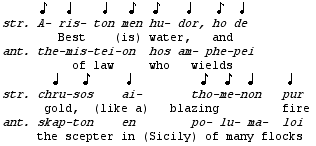From Wikipedia, the free encyclopedia.
Ode is a form of stately and elaborate lyrical verse. A classic ode is structured in three parts – the strophe, the antistrophe and the epode but different forms such as the homostrophic ode and the irregular ode exist.
Greek origins
There were two great divisions of the Greek melos or song; the one the personal utterance of the poet, the other, the choric song of his band of trained dancers. Each of these culminated in what have been called odes, but the former, in the hands of Alcaeus, Anacreon and Sappho, came closer to what modern criticism knows as lyric, pure and simple. On the other hand, the choir-song, in which the poet spoke for himself, but always supported, or interpreted, by a chorus, led up to what is now known as ode proper. It was Alcman, as is supposed, who first gave to his poems a strophic arrangement, and the strophe has come to be essential to an ode. Stesichorus, Ibycus and Simonides of Ceos led the way to the two great masters of ode among the ancients, Pindar and Bacchylides.
The form and verse-arrangement of Pindar’s great lyrics have regulated the type of the heroic ode. It is now perceived that they are consciously composed in very elaborate measures, and that each is the result of a separate act of creative ingenuity, but each preserving an absolute consistency of form. So far from being, as critics down to Cowley and Boileau supposed, utterly licentious in their irregularity, they are more like the canzos and sirvcntcs of the medieval troubadours than any modern verse. The Latins themselves seem to have lost the secret of these complicated harmonies, and they made no serious attempt to imitate the odes of Pindar and Bacchylides.
It is probable that the Greek odes gradually lost their musical character; they were accompanied on the flute, and then declaimed without any music at all. The ode, as it was practised by the Romans, returned to the personally lyrical form of the Lesbian lyrists. This was exemplified, in the most exquisite way, by Horace and Catullus; the former imitated, and even translated, Alcaeus and Anacreon, the latter was directly inspired by Sappho.
This article incorporates text from the 1911 Encyclop Continue reading Ode































